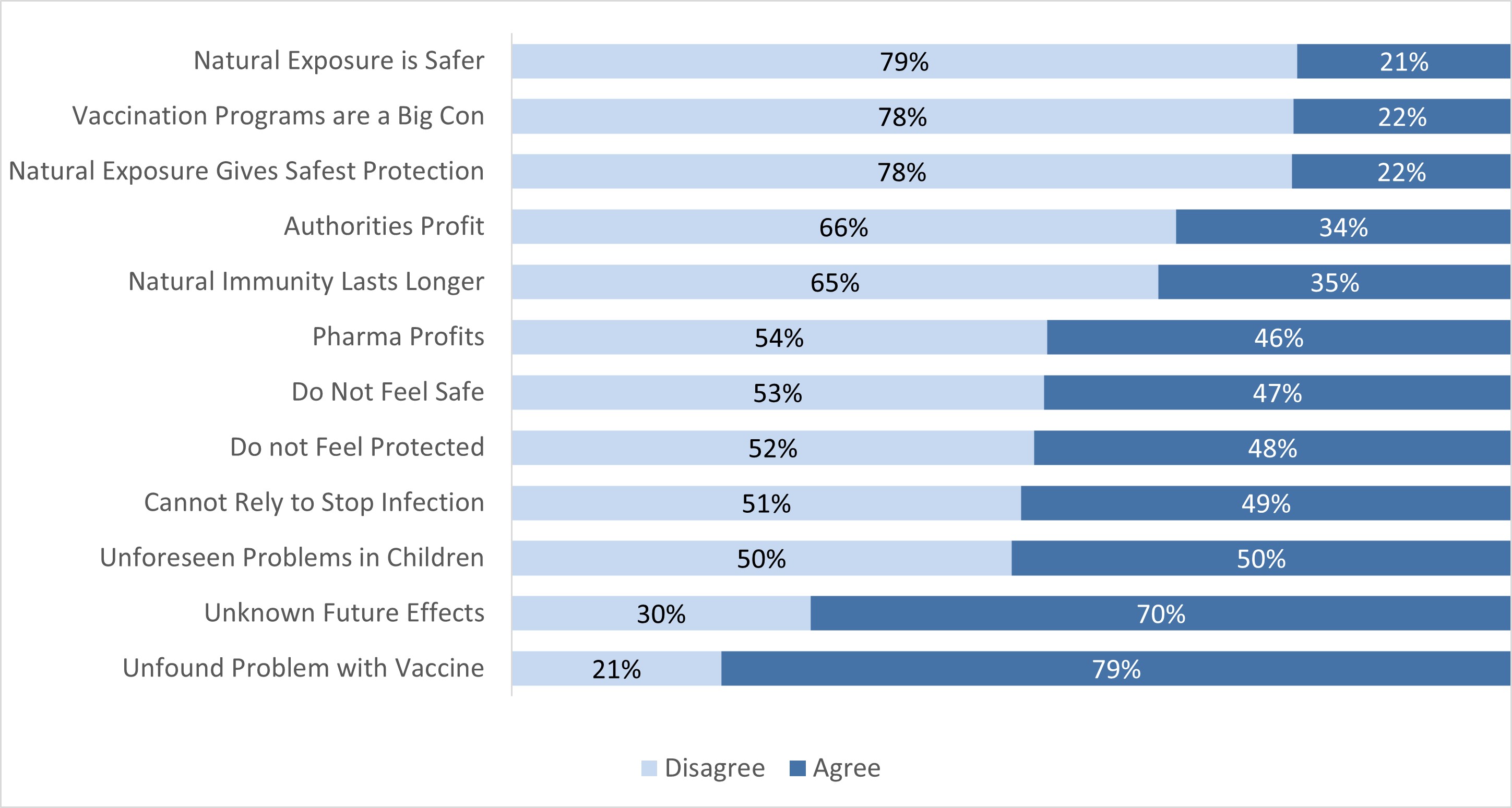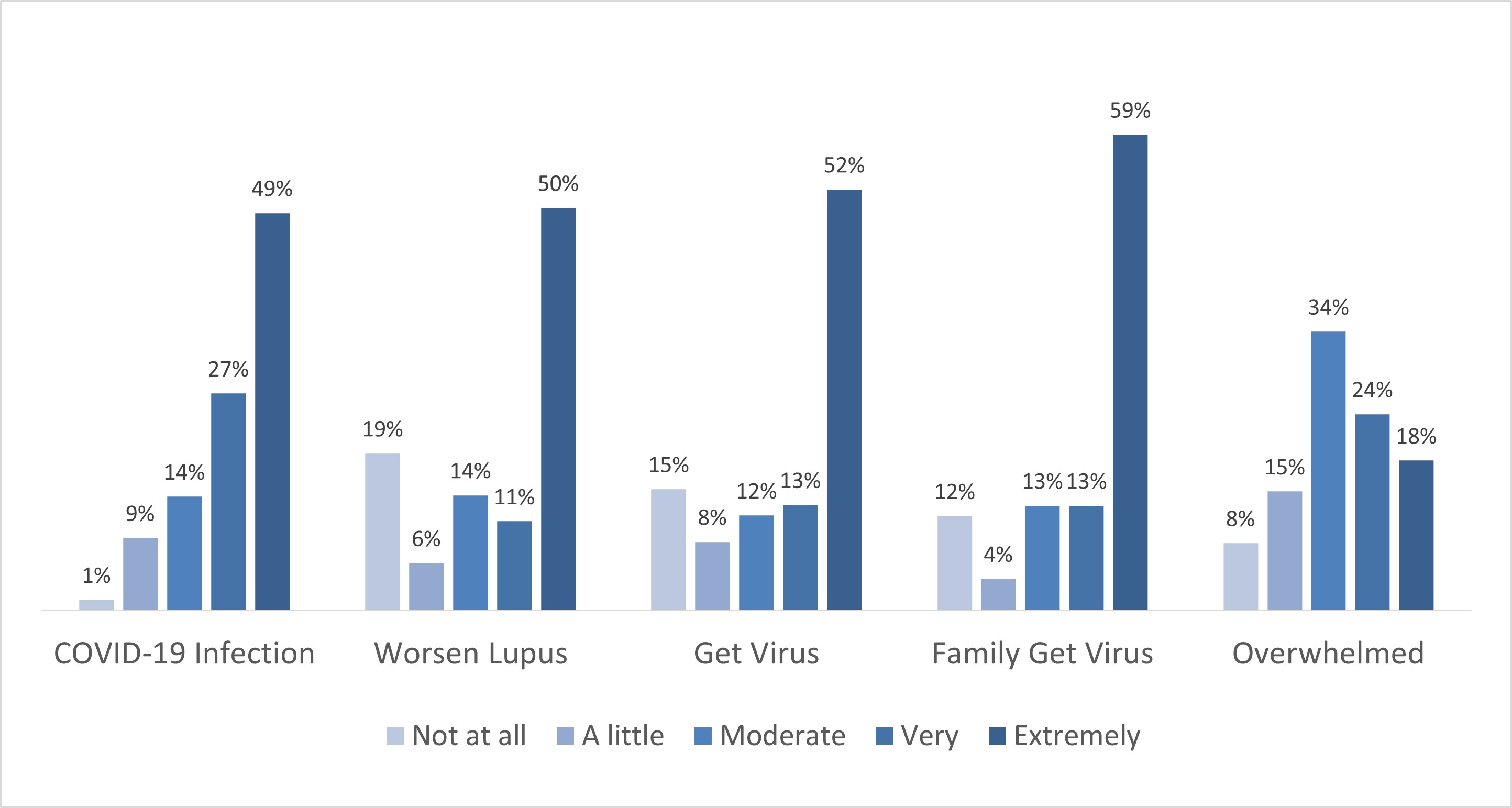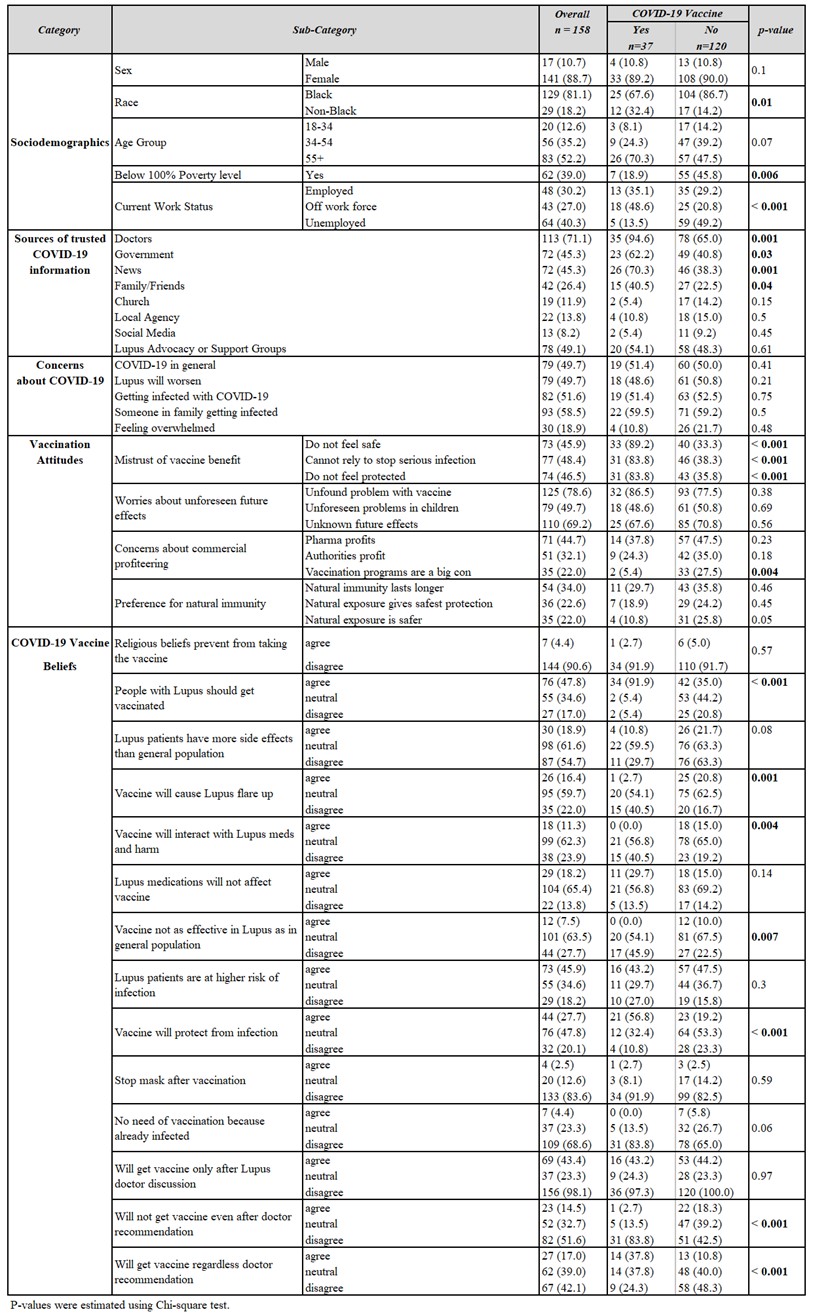Back
Poster Session A
Epidemiology, health policy and outcomes
Session: (0187–0213) Patient Outcomes, Preferences, and Attitudes Poster I
0211: Determinants of COVID-19 Vaccine Hesitancy in a Predominantly Black Population with Cutaneous Lupus Erythematosus
Saturday, November 12, 2022
1:00 PM – 3:00 PM Eastern Time
Location: Virtual Poster Hall
- SL
Sophia Lutgen, MD
Mount Sinai Morningside-West
New York City, NY, United States
Abstract Poster Presenter(s)
Sophia Lutgen1, S. Sam Lim2, Laura D. Aspey2, Gaobin Bao3, Charmayne Dunlop-Thomas2, Jessica N. Williams2 and Cristina Drenkard2, 1Mount Sinai Morningside-West, New York, NY, 2Emory University, Atlanta, GA, 3Emory University School of Medicine, Atlanta, GA
Background/Purpose: Due to demographic and disease-related factors, patients with lupus are deemed to be more vulnerable to COVID-19 infection than the general population, but they may be more hesitant to receive the COVID-19 vaccine. Black individuals have a higher susceptibility to chronic cutaneous lupus erythematosus (CCLE); however, these patients are underrepresented in COVID-19 studies. We studied vaccination and patients' perceptions during the early pandemic period in a predominantly Black cohort of patients with CCLE.
Methods: Patients with a validated diagnosis of CCLE enrolled in the population-based Georgians Organized Against Lupus (GOAL) Cohort were surveyed early in the pandemic, January through August 2021, after COVID-19 vaccination was available in the U.S. Validated tools assessed vaccination perceptions and ad hoc questions assessed COVID-19 concerns and vaccine status. We studied the relationship between vaccination status and trusted sources, concerns, beliefs, and vaccination attitudes.
Results: Of 158 respondents (54% primary CCLE and 46% CCLE + SLE), 82% returned the survey by August 2021. Most participants were Black (81%) and female (89%), with a mean age of 54; 40% reported living below the Federal poverty level and 42% were unemployed. Although 76% did not receive the vaccine, 17% and 6% received 1 and 2 doses, respectively. The most frequent vaccination attitudes were concerns about unfound problems (79%), unknown future effects (69%), unforeseen problems in children (50%), followed by reliability (49%), protection (48%), and safety (47%) (Fig. 1). Participants were highly concerned about COVID-19 infection consequences (Fig. 2). Black participants (p=0.01), those living in poverty (p=0.006), and unemployed (p< 0.001) were less likely to be vaccinated (Table 1). Doctors were a trusted source in 71% of participants, of which 31% received the vaccine (p=0.001). Mistrust was significantly related to unvaccinated status (p< 0.001). Participants who believed that lupus patients should get vaccinated, that vaccines protect against infection, or those that would get the vaccine regardless of a doctor's advice were more likely to be vaccinated (p< 0.001 for each); whereas those who believed the vaccine will cause lupus to flare (p=0.001), interacts with medications and causes harm (p=0.004), or is less effective in lupus patients than in the general population (p=0.007) were less likely to be vaccinated.
Conclusion: In the early pandemic period, only 23% of patients with CCLE were COVID-19 vaccinated. Participants who were Black, living in poverty, or unemployed were less likely to be vaccinated. Concerns about COVID-19 infection were not associated with vaccine status; whereas mistrust and negative beliefs of vaccine benefits were more likely to occur among those unvaccinated. Despite that 71% participants trusted their doctors, only 31% received the vaccine. Longitudinal studies are needed to assess changes in perceptions and vaccination rates. Education interventions are critical to mitigate vaccine hesitancy in CCLE patients, particularly among those of Black race and socioeconomically disadvantaged.
 Figure 1. Vaccination Attitudes among 158 participants of a population-based cohort with a validated diagnosis of CCLE. Vaccination attitudes were measured with the Examination (VAX) Scale.
Figure 1. Vaccination Attitudes among 158 participants of a population-based cohort with a validated diagnosis of CCLE. Vaccination attitudes were measured with the Examination (VAX) Scale.
 Figure 2. COVID-19 infection concerns reported by 158 participants of a population-based cohort with a validated diagnosis of CCLE.
Figure 2. COVID-19 infection concerns reported by 158 participants of a population-based cohort with a validated diagnosis of CCLE.
 Table. Factors Associated with COVID-19 Vaccination among Patients with Chronic Cutaneous Lupus Erythematosus.
Table. Factors Associated with COVID-19 Vaccination among Patients with Chronic Cutaneous Lupus Erythematosus.
Disclosures: S. Lutgen, None; S. Lim, None; L. D. Aspey, None; G. Bao, None; C. Dunlop-Thomas, None; J. Williams, None; C. Drenkard, None.
Background/Purpose: Due to demographic and disease-related factors, patients with lupus are deemed to be more vulnerable to COVID-19 infection than the general population, but they may be more hesitant to receive the COVID-19 vaccine. Black individuals have a higher susceptibility to chronic cutaneous lupus erythematosus (CCLE); however, these patients are underrepresented in COVID-19 studies. We studied vaccination and patients' perceptions during the early pandemic period in a predominantly Black cohort of patients with CCLE.
Methods: Patients with a validated diagnosis of CCLE enrolled in the population-based Georgians Organized Against Lupus (GOAL) Cohort were surveyed early in the pandemic, January through August 2021, after COVID-19 vaccination was available in the U.S. Validated tools assessed vaccination perceptions and ad hoc questions assessed COVID-19 concerns and vaccine status. We studied the relationship between vaccination status and trusted sources, concerns, beliefs, and vaccination attitudes.
Results: Of 158 respondents (54% primary CCLE and 46% CCLE + SLE), 82% returned the survey by August 2021. Most participants were Black (81%) and female (89%), with a mean age of 54; 40% reported living below the Federal poverty level and 42% were unemployed. Although 76% did not receive the vaccine, 17% and 6% received 1 and 2 doses, respectively. The most frequent vaccination attitudes were concerns about unfound problems (79%), unknown future effects (69%), unforeseen problems in children (50%), followed by reliability (49%), protection (48%), and safety (47%) (Fig. 1). Participants were highly concerned about COVID-19 infection consequences (Fig. 2). Black participants (p=0.01), those living in poverty (p=0.006), and unemployed (p< 0.001) were less likely to be vaccinated (Table 1). Doctors were a trusted source in 71% of participants, of which 31% received the vaccine (p=0.001). Mistrust was significantly related to unvaccinated status (p< 0.001). Participants who believed that lupus patients should get vaccinated, that vaccines protect against infection, or those that would get the vaccine regardless of a doctor's advice were more likely to be vaccinated (p< 0.001 for each); whereas those who believed the vaccine will cause lupus to flare (p=0.001), interacts with medications and causes harm (p=0.004), or is less effective in lupus patients than in the general population (p=0.007) were less likely to be vaccinated.
Conclusion: In the early pandemic period, only 23% of patients with CCLE were COVID-19 vaccinated. Participants who were Black, living in poverty, or unemployed were less likely to be vaccinated. Concerns about COVID-19 infection were not associated with vaccine status; whereas mistrust and negative beliefs of vaccine benefits were more likely to occur among those unvaccinated. Despite that 71% participants trusted their doctors, only 31% received the vaccine. Longitudinal studies are needed to assess changes in perceptions and vaccination rates. Education interventions are critical to mitigate vaccine hesitancy in CCLE patients, particularly among those of Black race and socioeconomically disadvantaged.
 Figure 1. Vaccination Attitudes among 158 participants of a population-based cohort with a validated diagnosis of CCLE. Vaccination attitudes were measured with the Examination (VAX) Scale.
Figure 1. Vaccination Attitudes among 158 participants of a population-based cohort with a validated diagnosis of CCLE. Vaccination attitudes were measured with the Examination (VAX) Scale. Figure 2. COVID-19 infection concerns reported by 158 participants of a population-based cohort with a validated diagnosis of CCLE.
Figure 2. COVID-19 infection concerns reported by 158 participants of a population-based cohort with a validated diagnosis of CCLE. Table. Factors Associated with COVID-19 Vaccination among Patients with Chronic Cutaneous Lupus Erythematosus.
Table. Factors Associated with COVID-19 Vaccination among Patients with Chronic Cutaneous Lupus Erythematosus.Disclosures: S. Lutgen, None; S. Lim, None; L. D. Aspey, None; G. Bao, None; C. Dunlop-Thomas, None; J. Williams, None; C. Drenkard, None.

